1
To return to love, to get the love we always wanted but never had, to have the love we want but are not prepared to give, we seek romantic relationships. We believe these relationships, more than any other, will rescue and redeem us. True love does have the power to redeem but only if we are ready for redemption. Love saves us only if we want to be saved.Bell Hooks
2
Individuals who want to believe that there is no fulfillment in love, that true love does not exist, cling to these assumptions because this despair is actually easier to face than the reality that love is a real fact of life but is absent from their lives.Bell Hooks
3
All too often women believe it is a sign of commitment, an expression of love, to endure unkindness or cruelty, to forgive and forget. In actuality, when we love rightly we know that the healthy, loving response to cruelty and abuse is putting ourselves out of harm's way.Bell Hooks
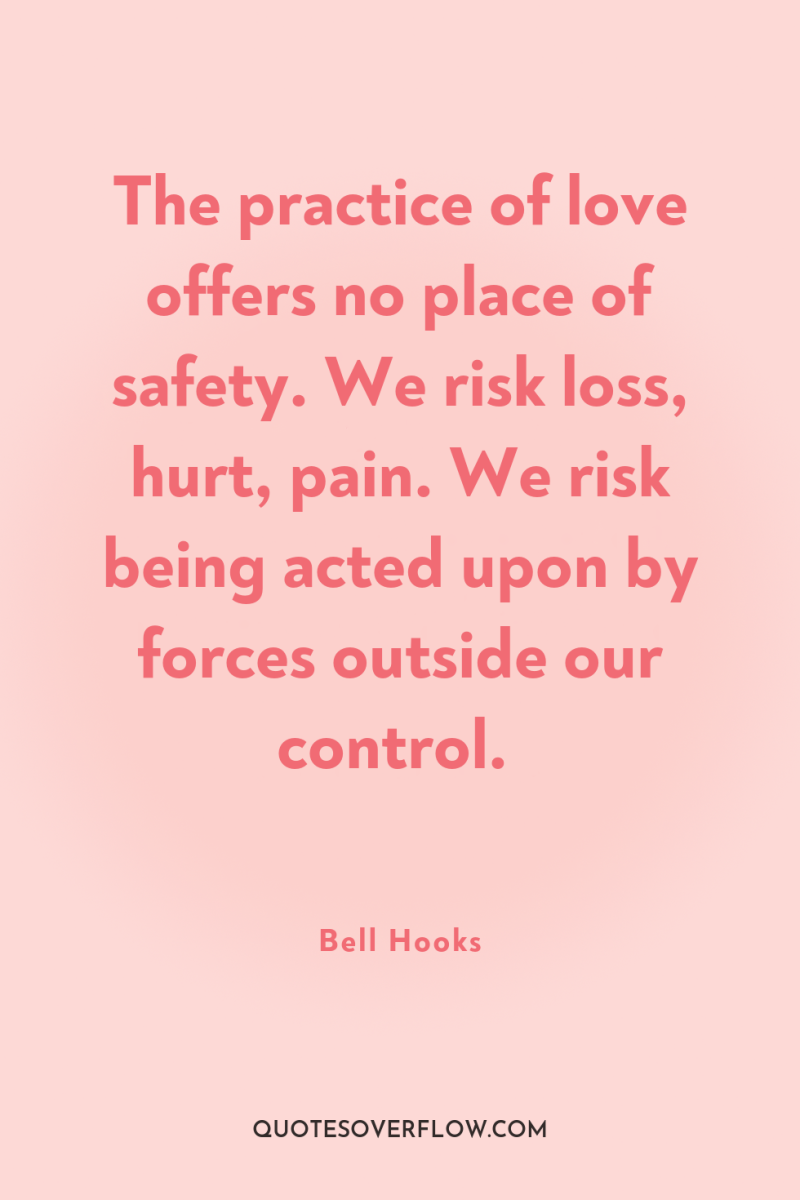
4
The practice of love offers no place of safety. We risk loss, hurt, pain. We risk being acted upon by forces outside our control.Bell Hooks
5
Contrary to what we may have been taught to think, unnecessary and unchosen suffering wounds us but need not scar us for life. It does mark us. What we allow the mark of our suffering to become is in our own hands.Bell Hooks
6
But many of us seek community solely to escape the fear of being alone. Knowing how to be solitary is central to the art of loving. When we can be alone, we can be with others without using them as a means of escape.Bell Hooks
7
The wounded child inside many males is a boy who, when he first spoke his truths, was silenced by paternal sadism, by a patriarchal world that did not want him to claim his true feelings. The wounded child inside many females is a girl who was taught from early childhood that she must become something other than herself, deny her true feelings, in order to attract and please others. When men and women punish each other for truth telling, we reinforce the notion that lies are better. To be loving we willingly hear the other’s truth, and most important, we affirm the value of truth telling. Lies may make people feel better, but they do not help them to know love.Bell Hooks
8
One of the best guides to how to be self-loving is to give ourselves the love we are often dreaming about receiving from others. There was a time when I felt lousy about my over-forty body, saw myself as too fat, too this, or too that. Yet I fantasized about finding a lover who would give me the gift of being loved as I am. It is silly, isn't it, that I would dream of someone else offering to me the acceptance and affirmation I was withholding from myself. This was a moment when the maxim "You can never love anybody if you are unable to love yourself" made clear sense. And I add, "Do not expect to receive the love from someone else you do not give yourself.Bell Hooks
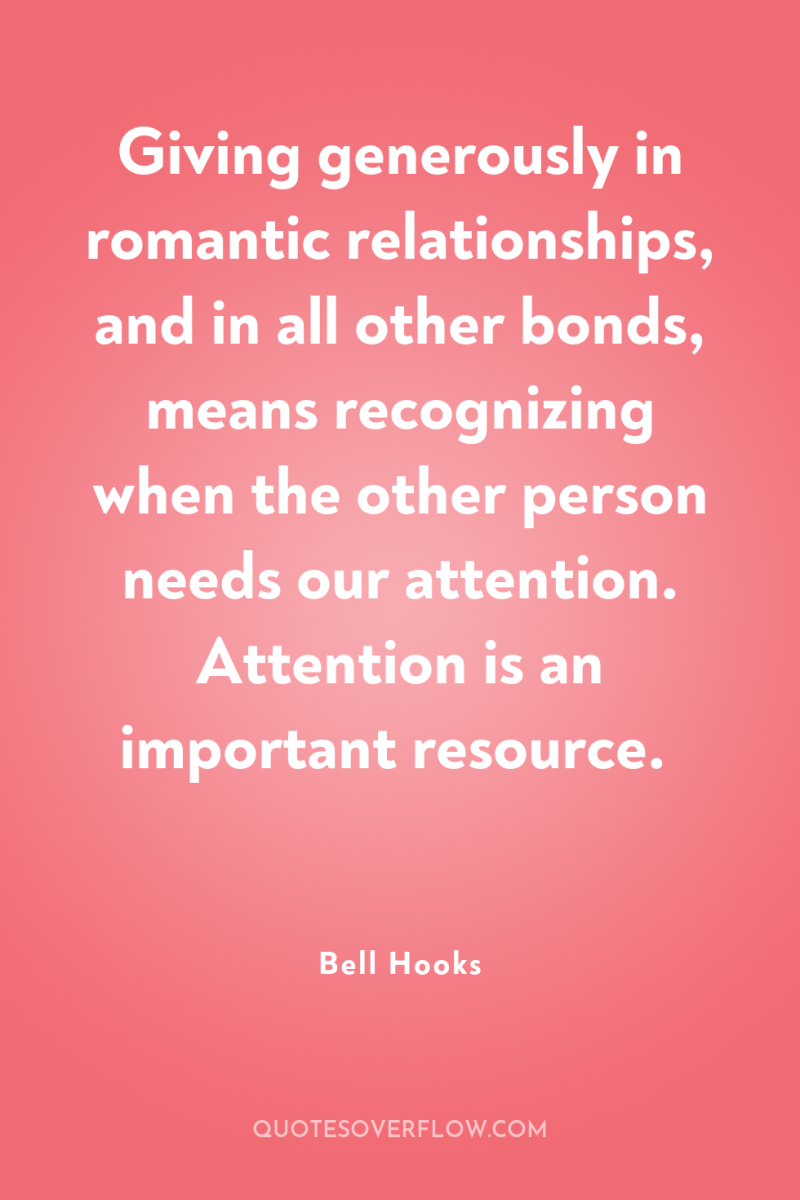
9
Giving generously in romantic relationships, and in all other bonds, means recognizing when the other person needs our attention. Attention is an important resource.Bell Hooks
10
Understanding knowledge as an essential element of love is vital because we are bombarded daily with messages that tell us love is about mystery, about that which cannot be known. We see movies in which people are represented as being in love who never talk with one another, who fall into bed without ever discussing their bodies, their sexual needs, their likes and dislikes. Indeed, the message is received from the mass media is that knowledge makes love less compelling; that it is ignorance that gives love its erotic and transgressive edge. These messages are brought to us by profiteering producers who have no clue about the art of loving, who substitute their mystified visions because they do not really know how to genuinely portray loving interaction. .Bell Hooks
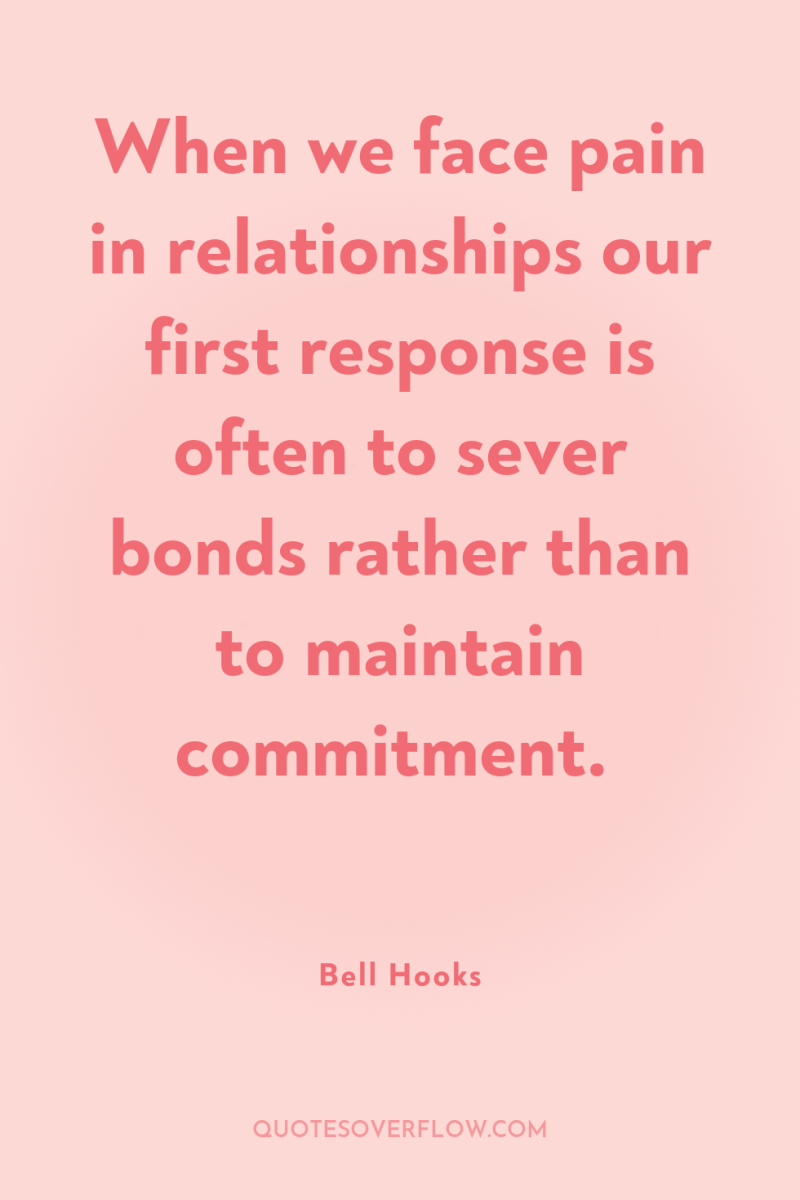
11
When we face pain in relationships our first response is often to sever bonds rather than to maintain commitment.Bell Hooks
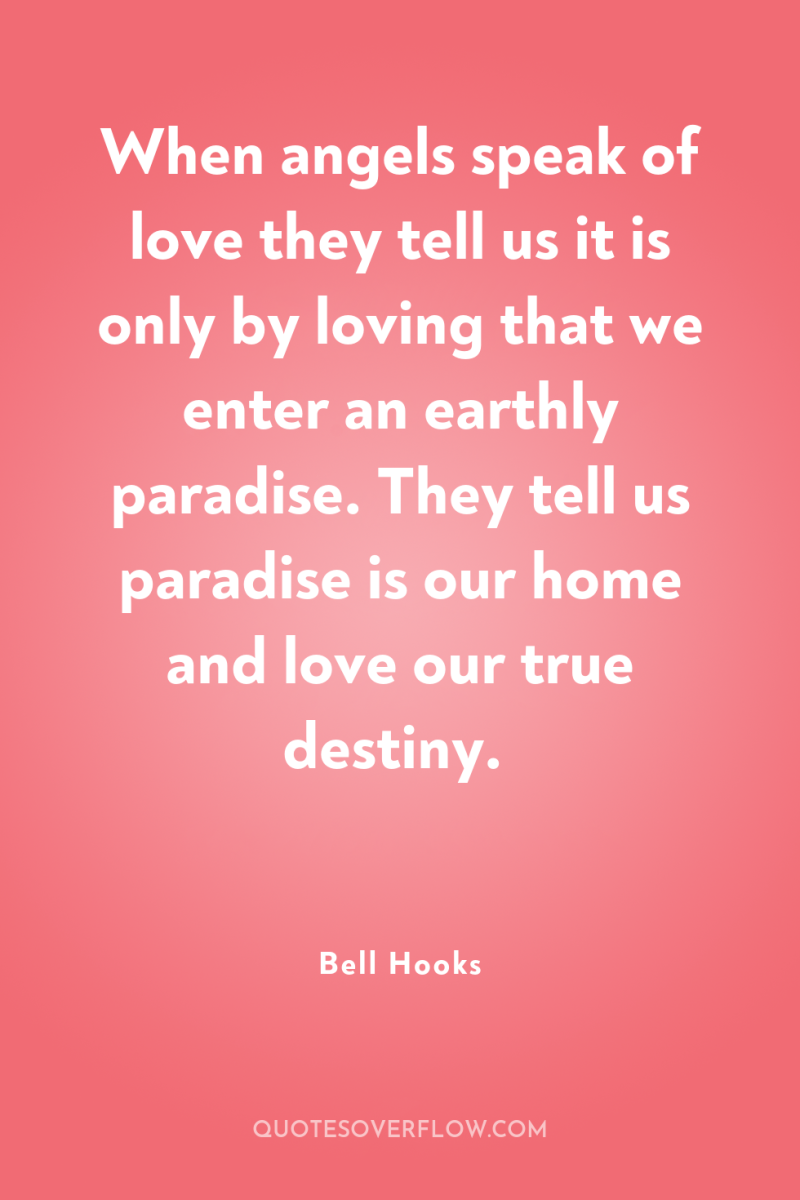
14
When angels speak of love they tell us it is only by loving that we enter an earthly paradise. They tell us paradise is our home and love our true destiny.Bell Hooks
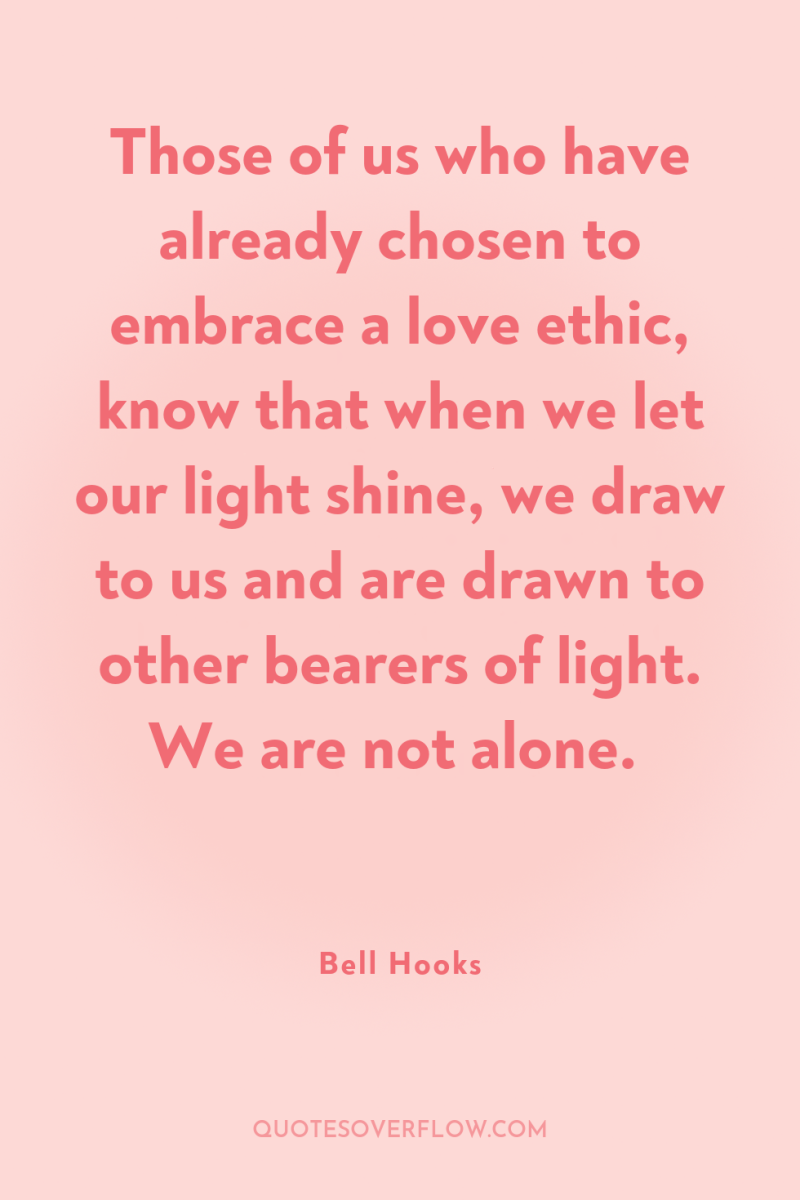
15
Those of us who have already chosen to embrace a love ethic, know that when we let our light shine, we draw to us and are drawn to other bearers of light. We are not alone.Bell Hooks
16
A generous heart is always open, always ready to receive our going and coming. In the midst of such love we need never fear abandonment. This is the most precious gift true love offers - the experience of knowing we always belong.Bell Hooks
17
When we understand love as the will to nurture our own and another's spiritual growth, it becomes clear that we cannot claim to love if we are hurtful and abusive. Love and abusive cannot coexist. Abuse and neglect are, by definition, the opposites of nurturance and care.Bell Hooks
18
The best sex and the most satisfying sex are not the same. I have had great sex with men who were intimate terrorists, men who seduce and attract by giving you just what you feel your heart needs then gradually or abruptly withholding it once they have gained your trust. And I have been deeply sexually fulfilled in bonds with loving partners who have had less skill and know-how. Because of sexist socialization, women tend to put sexual satisfaction in its appropriate perspective. We acknowledge its value without allowing it to become the absolute measure of intimate connection. Enlightened women want fulfilling erotic encounters as much as men, but we ultimately prefer erotic satisfaction within a context where there is loving, intimate connection. If men were socialized to desire love as much as they are taught to desire sex, we would see a cultural revolution. As it stands, most men tend to be more concerned about sexual performance and sexual satisfaction than whether they are capable of giving and receiving love.Bell Hooks
19
We have power as consumers. We can exercise that power all the time by not choosing to invest time, energy or funds to support the production of mass media images that do not reflect life-enhancing values, that undermine a love ethic.Bell Hooks
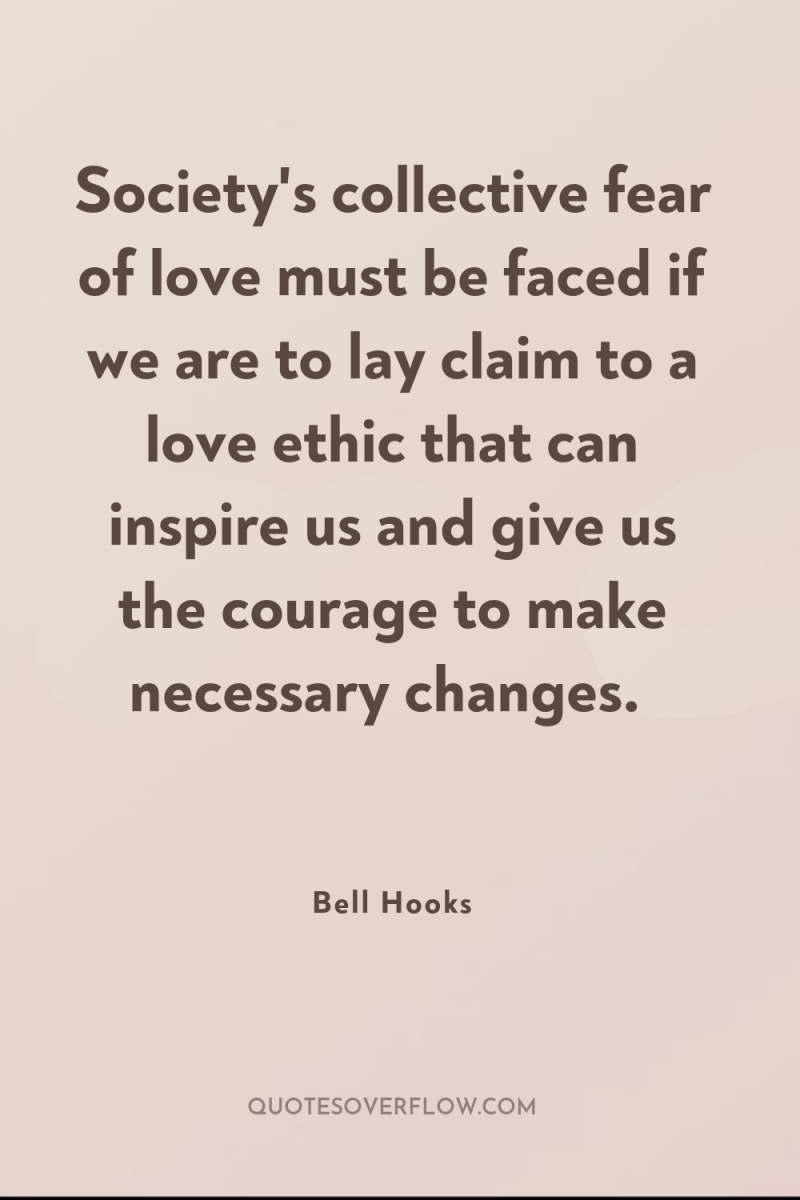
20
Society's collective fear of love must be faced if we are to lay claim to a love ethic that can inspire us and give us the courage to make necessary changes.Bell Hooks
21
When we work with love we renew the spirit; that renewal is an act of self-love, it nurtures our growth. It's not what you do but how you do it.Bell Hooks
22
As more people have found the courage to break through shame and speak about woundedness in their lives, we are now subjected to a mean-spirited cultural response, where all talk of woundedness is mocked. The belittling of anyone's attempt to name a context within which they were wounded, were made a victim, is a form of shaming. It is psychological terrorism. Shaming breaks our hearts. All individuals who are genuinely seeking well-being within a healing context realize that it is important to that process not to make being a victim a stance of pride or a location from which to simply blame others. We need to speak our shame and our pain courageously in order to recover. Addressing woundedness is not about blaming others; however, it does allow individuals who have been, and are, hurt to insist on accountability and responsibility both from themselves and from those who were the agents of their suffering as well as those who bore witness. Constructive confrontation aids our healing.Bell Hooks
23
Getting in touch with the lovelessness within and letting that lovelessness speak its pain is one way to begin again on love's journey. In relationships, whether heterosexual or homosexual, the partner who is hurting often finds that their mate is unwilling to 'hear' the pain. Women often tell me that they feel emotionally beaten down when their partners refuse to listen or talk. When women communicate from a place of pain, it is often characterized as 'nagging.' Sometimes women hear repeatedly that their partners are 'sick of listening to this shit.' Both cases undermine self-esteem. Those of us who were wounded in childhood often were shamed and humiliated when we expressed hurt. It is emotionally devastating when the partners we have chosen will not listen. Usually, partners who are unable to respond compassionately when hearing us speak our pain, whether they understand it or not, are unable to listen because that expressed hurt triggers their own feelings of powerlessness and helplessness. Many men never want to feel helpless or vulnerable. They will, at times, choose to silence a partner with violence rather than witness emotional vulnerability. When a couple can identify this dynamic, they can work on the issue of caring, listening to each other's pain by engaging in short conversations at appropriate times (i.e., it's useless to try and speak your pain to someone who is bone weary, irritable, reoccupied, etc.). Setting a time when both individuals come together to engage in compassionate listening enhances communication and connection. When we are committed to doing the work of love we listen even when it hurts.Bell Hooks
24
Much popular self-help literature normalizes sexism. Rather than linking habits of being, usually considered innate, to learned behavior that helps maintain and support male domination, they act as those these difference are not value laden or political but are rather inherent and mystical. In these books male inability and/or refusal to honestly express feelings is often talked about as a positive masculine virtue women should learn to accept rather than a learned habit of behavior that creates emotional isolation and alienation.. Self-help books that are anti-gender equality often present women's overinvestment in nurturance as a 'natural, ' inherent quality rather than a learned approach to caregiving. Much fancy footwork takes place to make it seem that New Age mystical evocations of yin and yang, masculine and feminine androgyny, and so on, are not just the same old sexist stereotypes wrapped in more alluring and seductive packaging.Bell Hooks
25
Usually, fundamentalists, be they Christian, Muslim, or any faith, shape and interpret religious thought to make it conform to and legitimize a conservative status quo. Fundamentalist thinkers use religion to justify supporting imperialism, militarism, sexism, racism, homophobia. They deny the unifying message of love that is at the heart of every major religious tradition.Bell Hooks
26
We spend a lifetime undoing the damage caused by cruelty, neglect, and all manner of lovelessness experienced in our families of origin and in relationships where we simply where we simply did not know what to do.Bell Hooks
27
All the romantic lore of our culture has told us when we find true love with a partner it will continue. Yet this partnership lasts only if both parties remain committed to being loving. Not everyone can bear the weight of true love. Wounded hearts turn away from love because they do not want to do the work of healing necessary to sustain and nurture love. Many men, especially, often turn away from true love and choose relationships in which they can be emotionally withholding when they feel like it but still receive love from someone else. Ultimately, they choose power over love. To know and keep true love we have to be willing to surrender the will to power. .Bell Hooks
28
We cannot know love if we remain unable to surrender our attachment to power, if any feeling of vulnerability strikes terror in our hearts. Lovelessness torments.Bell Hooks
29
In the Mars-and-Venus-gendered universe, men want power and women want emotional attachment and connection. On this planet nobody really has the opportunity to know love since it is power and not love that is the order of the day. The privilege of power is at the heart of patriarchal thinking. Girls and boys, men and women who have been taught this way almost always believe love is not important, or if it is, it is never as important as being powerful, dominant, in control, on top-being right. Women who give seemingly selfless adoration and care to the men in their lives appear to be obsessed with 'love, ' but in actuality their actions are often a covert way to hold power. Like their male counterparts, they enter relationships speaking the words of love even as their actions indicate that maintaining power and control is their primary agenda.Bell Hooks
30
Erotic attraction often serves as the catalyst for an intimate connection between two people, but it is not a sign of love. Exciting, pleasurable sex can take place between two people who do not even know each other. Yet the vast majority of males in our society are convinced that their erotic longing indicates who they should, and can, love. Led by their penis, seduced by erotic desire, they often end up in relationships with partners with whom they share no common interests of values. .Bell Hooks
31
When we love children, we acknowledge by our every action that they are not property, that they have rights - that we respect and uphold their rights.Bell Hooks
32
There can be no love without justice. Until we live in a culture that no only respects but also upholds basic civil rights for children, most children will not know love.Bell Hooks
33
Love was always and only about good feeling. In early adolescence when we were whipped and told that these punishments were 'for our own good' or 'I'm doing this because I love you, ' my siblings and I were confused. Why was harsh punishment a gesture of love? As children do, we pretended to accept this grown-up logic; but we knew in our hearts it was not right. We knew it was a lie. Just like the lie the grown-ups told when they explained after the harsh punishment, 'This hurts me more than it hurts you.' There is nothing that creates more confusion about love in the minds and hearts of children than unkind and/or cruel punishment meted out by the grown-ups they have been taught should love and respect. Such children learn early on to question the meaning of love, to yearn for love even as they doubt it exists.Bell Hooks
34
Through the practice of compassion and forgiveness, I was able to sustain my appreciation for her work and cope with the grief and disappointment I felt about the loss of this relationship. Practicing compassion enabled me to understand why she might have acted as she did and to forgive her. Forgiving means that I am able to see her as a member of my community still, one who has a place in my heart should she wish to claim it.Bell Hooks
35
Growing up is, at heart, the process of learning to take responsibility for whatever happens in your life. To choose growth is to embrace a love that heals.Bell Hooks
36
To live fully we would need to let go of our fear of dying. That fear can only be addressed by the love of living. We have a long history in this nation of believing that to be too celebratory is dangerous, that being optimistic is foolhardy, hence our difficulty in celebrating life, in teaching our children and ourselves how to love life.Bell Hooks
37
Ironically, the worship of of death as a strategy for coping with our underlying fear of death's power does not truly give us solace. It is deeply anxiety producing. The more we watch spectacles of death, of random violence and cruelty, the more afraid we become in our daily lives.Bell Hooks
38
Like many liberal men in the age of feminism, he believed women should have equal access to jobs and be given equal pay, but when it came to matters of home and heart he still believed caregiving was the female role. Like many men, he wanted a woman to be 'just like his mama' so that he did not have to do the work of growing up.Bell Hooks
39
Most men and women born in the fifties or earlier were socialized to believe that marriages and/or committed romantic bonds of any kind should take precedence over all other relationships. Had I been evaluating my relationships from a standpoint that emphasized growth rather than duty and obligation, I would have understood that abuse irreparably undermines bonds. All too often women believe it is a sign of commitment, an expression of love, to endure unkindness or cruelty, to forgive and forget. In actuality, when we love rightly we know that the healthy, loving response to cruelty and abuse is putting ourselves out of harm's way.. Women who would no more tolerate a friendship in which they were emotionally and physically abused stay in romantic relationships where these violations occur regularly. Had they brought to these bonds the same standards they bring to friendship they would not accept victimization.Bell Hooks
40
When we understand love as the will to nurture our own and another's spiritual growth, it becomes clear that we cannot claim to love if we are hurtful and abusive. Love and abusive cannot coexist. Abuse and neglect are, by definition, the opposites of nurturance and care.. An overwhelming majority of us come from dysfunctional families in which we were taught that we were not okay, where we were shamed, verbally and/or physically abused, and emotionally neglected even as we were also taught to believe that we were loved. For most folks it is just too threatening to embrace a definition of love that would no longer enable us to see love as present in our families. Too many of us need to cling to a notion of love that either makes abuse acceptable or at least makes it seem that whatever happened was not that bad.Bell Hooks
41
If you go door to door in our nation and talk to citizens about domestic violence, almost everyone will insist that they do not support male violence against women, that they believe it to be morally and ethically wrong. However, if you then explain that we cannot end male violence against women by challenging patriarchy, and that means no longer accepting the notion that men should have more rights and privileges than women because of biological difference or that men should have the power to rule over women, that is when the agreement stops. There is a gap between the values they claim to hold and their willingness to do the work of connecting thought and action, theory and practice to realize these values and thus create a more just society.Bell Hooks
42
Practically every mental health care practitioner, from the most erudite psychoanalysts to untrained self-help gurus, tell us that it is infinitely more fulfilling and we are all saner if we tell the truth, yet most of us are not rushing to stand up and be counted among the truth tellers. Indeed, as someone committed to being honest in daily life I experience the constant drag of being seen as a 'freak, ' for telling the truth, even when I speak truthfully about simple matters. If a friend gives me a gift and asks me to tell him or her whether I like it, I will respond honestly and judiciously; that is to say I will speak the truth in a positive, caring manner. Yet even in this situation, the person who asks for honesty will often express annoyance when given a truthful response. .Bell Hooks
43
Definitions are vital starting points for the imagination. What we cannot imagine cannot come into being. A good definition marks our starting point and lets us know where we want to end up. As we move toward our desired destination we chart the journey, creating a map. We need a map to guide us on our journey to love--starting with the place where we know what we mean when we speak of love.Bell Hooks
44
Isolation and loneliness are central causes of depression and despair.Bell Hooks
45
Isolation and loneliness are central causes of depression and despair. Yet they are the outcome of life in a culture where things matter more than people. Materialism creates a world of narcissism in which the focus of life is solely on acquisition and consumption. A culture of narcissism is not a place where love can flourish. The emergence of "me" culture is a direct response to our nation's failure tot truly actualize the vision of democracy. While emotional needs are difficult, and often impossible to satisfy, material desires are easier to fulfill.Bell Hooks
46
Those who choose to walk on love's path are well served if they have a guide. That guide can enable us to overcome fear if we trust that they will not lead us astray or abandon us along the way.Bell Hooks
47
Choosing to be honest is the first step in the process of love. There is no practitioner of love who deceives. Once the choice has been made to be honest, then the next step on love's path is communication.Bell Hooks
48
Concurrently, when it comes to matters of the heart we are encouraged to treat partners as though they were objects we can pick up, use, and the discard and dispose of at will, with the one criteria being whether or not individualistic desires are satisfied.Bell Hooks
49
Both men and women remain in dysfunctional, loveless relationships when it is materially opportune.Bell Hooks
50
Women have endeavored to guide men to love because patriarchal thinking has sanctioned this work even as it has undermined it by teaching men to refuse guidance… A useful gift all love’s practitioners can give is the offering of forgiveness. It not only allows us to move away from blame, from seeing others as the cause of our sustained lovelessness, but it enables us to experience agency, to know we can be responsible for giving and finding love.Bell Hooks